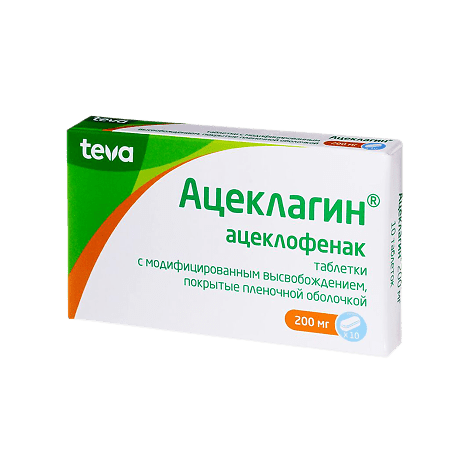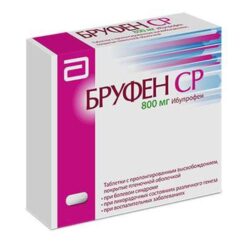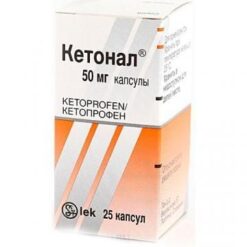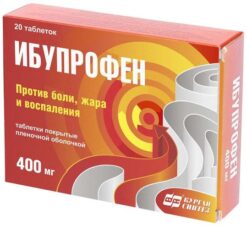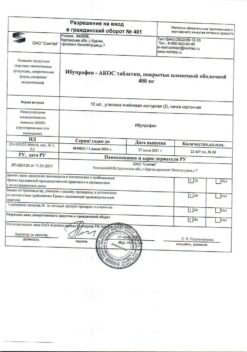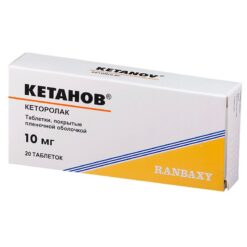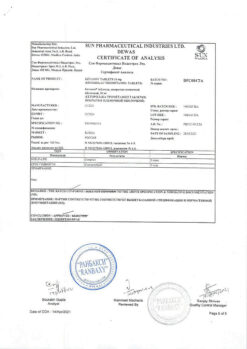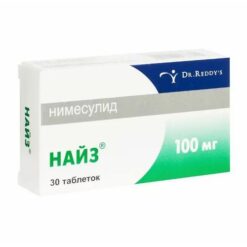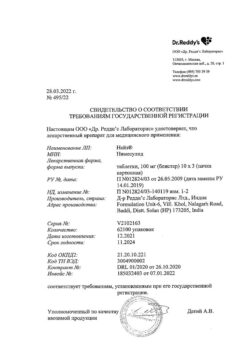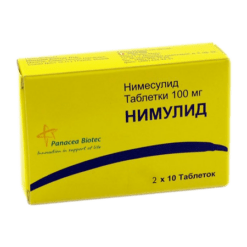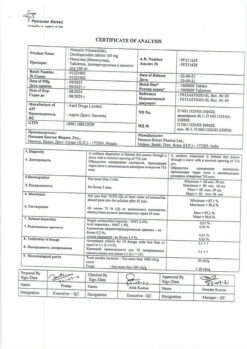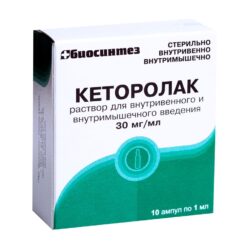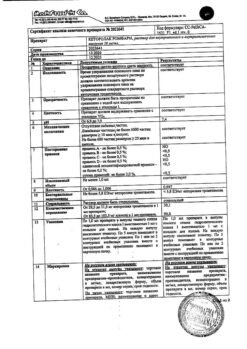No products in the cart.
Aceclagin, 200 mg 10 pcs
€13.85 €12.12
Description
Pharmacotherapeutic group: Non-steroidal anti-inflammatory drug (NSAIDs)
ATCode: M01AB16
Pharmacological properties
Pharmacodynamics
Aceclofenac has anti-inflammatory, analgesic, antipyretic effects. Inhibits the synthesis of prostaglandins and thus affects the pathogenesis of inflammation, pain and fever. In rheumatic diseases the anti-inflammatory and analgesic effect of aceclofenac significantly reduces the severity of pain, morning stiffness, joint swelling which improves the functional state of the patient.
Pharmacokinetics
absorption. Acclofenac is rapidly absorbed after oral administration. Maximum concentration (Cmax) in blood plasma is reached 1.25-3 hours after oral administration. Food intake slows down absorption, but does not affect its degree.
Distribution Aceclofenac is highly bound to plasma proteins (˃99.7%). Aceclofenac penetrates into the synovial fluid, where its concentration reaches 60% of its concentration in blood plasma. The volume of distribution is 30 liters.
Metabolism It is believed that aceclofenac is metabolized by CYP2C9 isoenzyme to form the metabolite 4-OH-aceclofenac. Diclofenac and 4-OH-diclofenac are among the numerous metabolites of aceclofenac.
Evolution.The average half-life (T1/2) of modified-release tablets is about 5 hours. Clearance is 5 l/h. Approximately 2/3 of the dose taken is excreted by the kidneys, mainly as conjugated hydroxymetabolites. Only 1% of the dose after oral administration is excreted unchanged.
Indications
Indications
Relief of inflammation and pain in lumbago, toothache, glenohumeral periarthritis, rheumatic soft tissue lesions, for the symptomatic treatment of rheumatoid arthritis, osteoarthritis and ankylosing spondylitis.
Symptomatic therapy, reducing pain and inflammation at the time of use, does not affect the progression of the disease.
Dysmenorrhea.
Pharmacological effect
Pharmacological effect
Pharmacotherapeutic group: non-steroidal anti-inflammatory drug (NSAID)
ATX code: M01AB16
Pharmacological properties
Pharmacodynamics
Aceclofenac has anti-inflammatory, analgesic, antipyretic effects. Inhibits the synthesis of prostaglandins and, thus, affects the pathogenesis of inflammation, pain and fever. In rheumatic diseases, the anti-inflammatory and analgesic effect of aceclofenac helps to significantly reduce the severity of pain, morning stiffness, and swelling of the joints, which improves the patient’s functional condition.
Pharmacokinetics
Suction. After oral administration, aceclofenac is rapidly absorbed. The maximum concentration (Cmax) in blood plasma is achieved 1.25-3 hours after oral administration. Eating slows down absorption, but does not affect its degree.
Distribution. Aceclofenac is highly bound to plasma proteins (˃99.7%). Aceclofenac penetrates into the synovial fluid, where its concentration reaches 60% of its concentration in the blood plasma. The distribution volume is 30 l.
Metabolism. It is believed that aceclofenac is metabolized by the CYP2C9 isoenzyme to form the metabolite 4-OH-aceclofenac. Diclofenac and 4-OH-diclofenac are among the numerous metabolites of aceclofenac.
Excretion. The average half-life (T1/2) when taking modified-release tablets is about 5 hours. Clearance is 5 l/h. Approximately 2/3 of the dose taken is excreted by the kidneys, mainly in the form of conjugated hydroxymetabolites. Only 1% of the dose after oral administration is excreted unchanged.
Special instructions
Special instructions
The simultaneous use of Aceclagin and other NSAIDs, including selective cyclooxygenase-2 (COX-2) inhibitors, should be avoided.
Active ingredient
Active ingredient
Aceclofenac
Composition
Composition
1 tablet contains: active ingredient aceclofenac 200.0 mg; excipients: microcrystalline cellulose 159.5 mg, povidone K30 19.5 mg, croscarmellose sodium 9.7 mg, sodium stearyl fumarate 15.3 mg; poloxamer 407 4.5 mg, hypromellose 40.5 mg, carbomer 941 2.5 mg.
Shell composition: Opadry white OY-S-7000 A 12.0 mg: hypromellose 5cP (E 464) 54.850%, titanium dioxide (E 171) 22.860%, ethylcellulose 10cP 13.720%, diethyl phthalate 8.570%.
Pregnancy
Pregnancy
Pregnancy
The use of Aceclagin® is contraindicated during pregnancy. There is no information on the use of aceclofenac during pregnancy. Inhibition of prostaglandin synthesis may adversely affect the course of pregnancy and/or the development of the embryo/fetus.
During the third trimester of pregnancy, all prostaglandin synthesis inhibitors:
having cardiopulmonary toxicity, they can cause premature closure of the Botallo duct with the development of pulmonary hypertension;
may cause impaired fetal renal function, which may progress to renal failure in combination with polyhydramnios.
In late pregnancy:
the drug may affect the duration of bleeding due to the antiplatelet effect, which can develop even after using very low doses;
the drug may suppress uterine contractions, causing delayed labor or prolonged labor. Breastfeeding period
The drug should not be taken during breastfeeding. There is no data on the excretion of aceclofenac in human milk. In preclinical studies, no significant transfer of radioactivity into milk was observed when radioactive C-aceclofenac was administered.
Fertility
Nonsteroidal anti-inflammatory drugs (NSAIDs) may affect fertility and are not recommended for use by women planning pregnancy.
Contraindications
Contraindications
Hypersensitivity to aceclofenac or auxiliary components of the drug;
bronchospasm, rhinitis or urticaria after taking acetylsalicylic acid or other NSAIDs in history (complete or incomplete acetylsalicylic acid intolerance syndrome – rhinosinusitis, urticaria, polyps of the nasal mucosa, bronchial asthma);
erosive and ulcerative lesions of the mucous membrane of the gastrointestinal tract (GIT) in the acute phase (including ulcerative colitis, Crohn’s disease);
gastrointestinal bleeding or suspicion of it;
severe heart failure (class II-IV according to the New York Heart Association classification), coronary heart disease, diseases of the peripheral arteries and/or cerebral arteries;
period after coronary artery bypass surgery;
severe liver failure or active liver disease;
severe renal failure (creatinine clearance <30 ml/min), progressive kidney disease, confirmed hyperkalemia;
disorders of hematopoiesis and coagulation;
pregnancy and breastfeeding;
children under 18 years of age.
With caution
History of liver, kidney and gastrointestinal diseases, bronchial asthma, arterial hypertension, decreased circulating blood volume (including after major surgical interventions), coronary heart disease, chronic renal and hepatic and heart failure, creatinine clearance less than 60 ml/min, history of ulcerative lesions of the gastrointestinal tract, presence of Helicobacter pylori infection, dyslipidemia/hyperlipidemia, diabetes mellitus, smoking, old age, long-term use of NSAIDs, severe somatic diseases, alcoholism.
Side Effects
Side Effects
The following are adverse events reported in clinical studies and post-marketing surveillance. The incidence of adverse events is classified as follows: very often (≥ 1/10); often (from ≥ 1/100 to < 1/10); uncommon (from ≥ 1/1000 to < 1/100), rare (from ≥ 1/10000 to < 1/1000), very rare (< 1/10000).
Interaction
Interaction
With the exception of concomitant use with warfarin, no drug interaction studies have been conducted.
Aceclofenac is metabolized by the CYP2C9 isoenzyme; In vitro data indicate that aceclofenac may be an inhibitor of this enzyme.
Overdose
Overdose
There is no data on an overdose of aceclofenac in humans.
Storage conditions
Storage conditions
Store at a temperature not exceeding 30 °C.
Keep out of the reach of children.
Shelf life
Shelf life
2 years.
Manufacturer
Manufacturer
Korea United Pharm. Inc., Republic of Korea
Additional information
| Shelf life | 2 years. |
|---|---|
| Conditions of storage | Store at a temperature not exceeding 30 ° C. Store out of the reach of children. |
| Manufacturer | Korea United Pharm. Inc., Korea Republic. |
| Medication form | controlled release tablets |
| Brand | Korea United Pharm. Inc. |
Related products
Buy Aceclagin, 200 mg 10 pcs with delivery to USA, UK, Europe and over 120 other countries.

